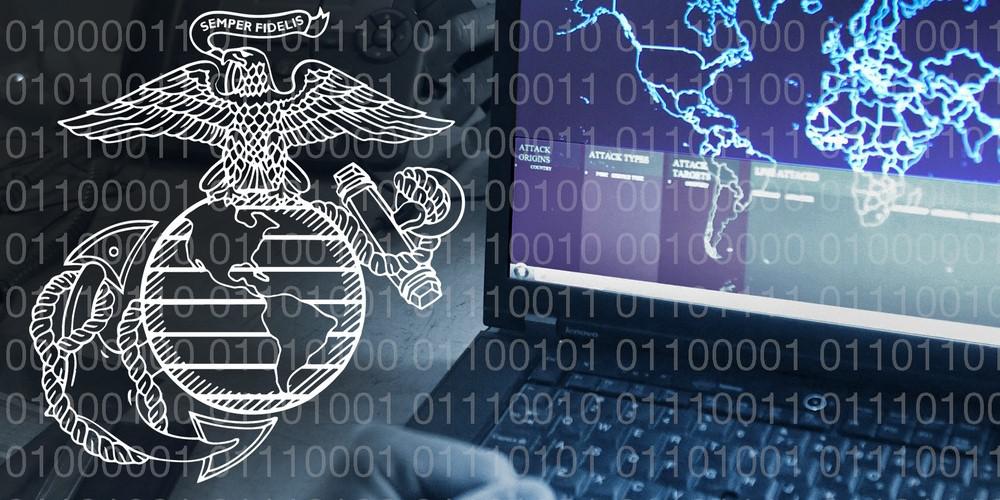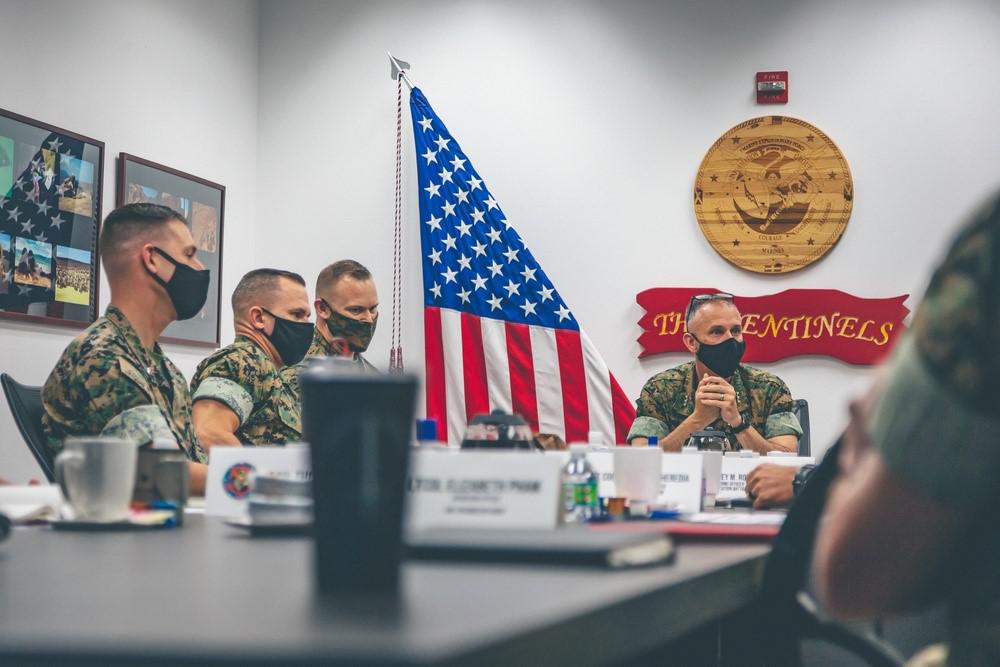New Marine Platform Aims to Be Force Multiplier
A comprehensive learning platform and a development organization created by the U.S. Marine Corps is working to enhance the information technology, cybersecurity and intelligence skills of Marines. Along with building developmental partnerships, the new Information Development Institute is a centralized place for a comprehensive offering of in-person or on-demand training and education, designed to meet Marine Corps training requirements as well as innovatively provide continuous learning opportunities.
For the service’s deputy commandant for information (DCI), Lt. Gen. Matthew Glavy, USMC, the Information Development Institute’s (IDI’s) effort is a key part of building a technologically savvy Marine Corps force that will support the greater Fleet Marine Force through near-peer competition.
“As we look at Force Design going forward, all facets of the Marine Corps are going to get more technical and more cognitive,” Gen. Glavy states. “The ability to understand what the adversary is doing in competition and in this deterrence space where we find ourselves is so important. And across the Marine Corps, the high tide has got to raise all boats, especially in this very technical environment, which is the environment of information. We’ve had to look at it from an opportunity base and from a necessity perspective. In order to make Force Design successful, we have to have well-trained, well-led, well-educated, incredible people doing what the commandant needs to get done.”
The idea for the IDI—which was stood up at the beginning of this fiscal year—stemmed from the previous DCI, Lt. Gen. Lori Reynolds, USMC (Ret.), Gen. Glavy explains. The effort also is part of the service’s greater 21rst Century Learning effort. “Gen. Reynolds and her team put this together and it just happens to be on my watch that I get to roll it out,” he says. “The Information Development Institute was her brainchild. She knew that we had to invest in our people.”
Through an early user pilot aimed at Marine Corp civilian employees, IDI’s newly established learning network has already reached 500 people in the past several months, with a much greater expansion goal, Gen. Glavy notes.
“We really want to expand this as fast as possible,” he explains. “Right now, we have a prototype of 400 people that are involved. It is license-based, so we have to work through all that, and we are tracking the group very closely, their progress, their outcomes, what they think of it all. Additionally, we have another 100 out at our Marine Corps schools that are using the licenses in a classroom augmentation style. This is kind of our initial ink blot that we wanted to start with to understand what’s working, what’s not, the quality improvements we want to make, feedback from the group that is using it right now. Then we want to expand very, very quickly, and we want to push this further and further.”
By beginning with Marine Corps civilians, the service is focusing on recruiting, developing and retaining this portion of its talented workforce. “This ‘war for talent’ that we find ourselves in [has us] competing everywhere for talent,” he states. “And we are a startup. We need to scale. We need to get mass, we need to get velocity and we need to be very attentive to our customer base, our owners and operators, which are incredible, amazing people that work in the Marine Corps. We need to be very focused on where they are going, what they are doing and combine it with the vision of the commandant on where we are going with force design. All of that comes into play.”
Ultimately, Marines all over the world working in related information technology, cyber and intelligence fields will have access to the IDI’s training and educational resources. “This is meant to go high order, to go all the way down to our communications battalions, our network battalions, and our other technical entities that need these skills,” he exclaims. “There’s just going to be a place and time where an operations clerk that is working in a cloud environment needs to have some of these technical skills as well. And we want to make this open to all commanders. We need everybody to have this since in this environment, everything they touch has a technical side. It’s a knowledge-based environment.”
To make it easy to access, the IDI training and education is offered via a familiar tool, MarineNet, and its eLearning ecosystem. This helps to minimize costs and optimizes integration with the service’s other learning resources, the general says. “MarineNet is a very natural thing for these Marines to use,” he shares. “We do a lot of our annual training on there, and it encompasses quite a bit of the online, platform-based capability of the Marine Corps.”
Specifically, IDI’s comprehensive learning network offers access to technical training, development resources, learning partnerships, educational opportunities and Pluralsight’s online technology learning platform.
“The lion’s share of our work right now has been on the learning network,” Gen. Glavy says. “We do want to get into partnerships and experiences with industry and with other members of the IC [intelligence community], but COVID and other things have probably slowed us down. But to our advantage, COVID has made us focus on the network side of it, because of the need to telework. We have really had to push hard and gain some momentum to get after how we establish our portals in our networks.”
For the technical training aspect, IDI did partner with Naval Information Warfare Center, or NIWC, and the General Services Administration to provide virtual and live courses on the platform that support specific Marine Corps certification and technical training for security, networking and applications skill sets. The technical training module currently includes 37 courses, the general confirms.
Regarding the learning partnerships, IDI is beginning to work with several academic institutions to bring degree-based instructional programs to the IT, cyber and intel Marine workforce. As part of its role, IDI will serve as a clearinghouse for “ready-to-engage opportunities” with industry, academia and other federal and public organizations. Meanwhile, the learning experiences that IDI will organize aim to encourage cross-training and exposure to different career pathways through stints with the industry and other rotational opportunities.
In addition, IDI is offering Marine Credentialing Opportunities On-Line, or so-called COOL Certification vouchers, designed to offset unit and out-of-pocket costs for tests and fees. Personnel must register and apply for COOL voucher consideration.
Moreover, IDI is offering specific subscriptions to Pluralsight’s learning platform, which has unlimited access to more than 10,000 on-demand technology courses, skills-based learning content organized by work roles, continual so-called “Skill IQ” assessments and test preparation modules, the service reports. Those Marines in IT and cybersecurity may request subscriptions at no cost to their commands.
“Pluralsight is an industry partner doing good stuff and we are in the early phase of that relationship with them as we roll all this out,” Gen. Glavy clarified. “We’re working together significantly to gain an advantage [through learning].”
In addition to the DCI, the IDI is managed by stakeholders from the information technology, cybersecurity and intelligence communities, the general says, including Marine Corps Forces Cyberspace Command (MARFORCYBER)—of which he was the leader for the previous three years—and the command it directly reports to, the U.S. Cyber Command.
“This relationship between the DCI and MARFORCYBER is very strong,” Gen. Glavy explains. “We obviously provide supporting functions to MARFORCYBER, whether it is resource-based, insights, policy-based requirements, whatever they may need to be successful.”
In return, the service’s cyber command will advise on any related requirements to the DCI, especially regarding the needed cyber, intelligence and information warfare training, as the command faces day-in, day-out cyber warfare from adversaries. “The demand signal is there,” the general notes. “They are always in this quest for knowledge and in the quest to get ahead of change, especially from a technology standpoint, [since] the adversary moves very fast.”
In addition to the IDI providing the key technical skills that cyber warriors, information technologists and intelligence analysts need to defend our country, the general hopes the IDI’s offerings reach the Marines on a personal level, providing support and inspiration across their careers.
“We’ve got to create an environment that people want to be a part of, an environment of success and an environment of doing,” Gen. Glavy advises. “That has to be an area that draws them in. And it is not only the environment but also the empowerment [that makes] people join. They want skin in the game. They want to have an impact and their voices heard. They want to be tied to outcomes. And also, what we are talking about is this idea of how do you make amazing people even better.”







Comments